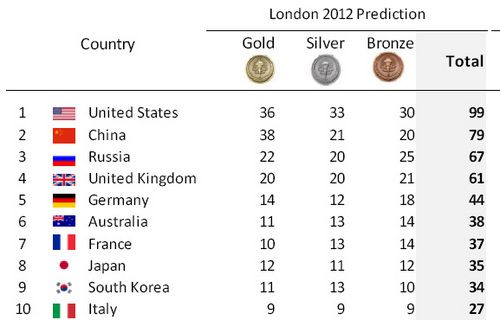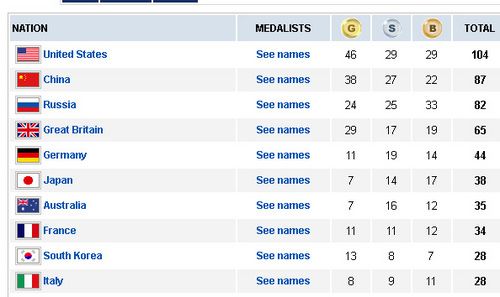The Monday Morning Rouser:
The Olympics are over, so let’s check back in with the fancy math model that predicted the medal counts.
Earlier this summer, Dan Graettinger formulated his model for predicting how each country would do in London, with a calculation of gross domestic product and even the Internet:
The single characteristic most closely associated with winning Olympic medals is … number of internet users . My initial reaction was, “What the heck??!!” This is a good time to point out that good predictors may not actually cause the outcome, but rather go together with (correlate to) the outcome. After further thought, I realized that the number of internet users does tell us a lot about a country. The people are wealthy enough to afford computers and internet access. The population of the country is relatively large (since this piece of data measured the total number of users, not users per capita). Finally, the people have enough free time on their hands to engage in non-subsistence-related activities, like participating in sports or surfing the net!
Graettinger also used an “economic freedom” component in his calculation. NPR reports the model was 97-percent accurate, although it’s difficult for non-mathies (bowing) to see just how that works out, since just about everybody could’ve predicted the U.S. and China would’ve won the most medals.
Conento, a Spanish marketing firm, also put together a model. In this paragraph — somewhere — is a reasoned explanation of how:
What is the reliability of the model and what type of data can help us making this estimate? The mathematical model obtained by a Poisson regression (a more technical version of the article, with details on the methodology used can be downloaded from the same website), can explain almost 96% of the medals from each country in previous Olympics, relying on three main sources of information. The first is made up by the medal counts for the last four Olympics (Atlanta 1996, Sydney 2000, Athens 2004 and Beijing 2008), with greater weight for those Games closer to our time. Of course, if a country in the past won a high number of medals, it would make us assume that this result could be repeated. Lacking any additional information, the safest bet is an “evolution in continuity”, although it may be otherwise.
So let’s just go to the prediction:
And the results…
Show offs. But nobody predicted the Spice Girls reunion.
Here are the most absurd moments from last night’s closing ceremonies.
Related: A woman rappelled 40 stories down a skyscraper in Seattle to raise money for Special Olympics. The pictures are spectacular.
Who do people in one location pay one price for gasoline and a few blocks away, people pay another?
“It’s the age-old question,” Paul Mutch, vice chairman with the North Dakota Petroleum Marketers Association, tells the Grand Forks Herald in its story today about the patterns of gas prices.
Take a look at the map for the current gas prices for the region (from MinnesotaGasPrices.com)…

The prices change, of course, but the pattern usually doesn’t. Differences from state to state are often a reflection of taxes, but within a state, what accounts for it? Unfortunately the paper doesn’t answer the question in its article.
Meanwhile, the recent rapid runup in gasoline prices are being blamed on refinery woes and ethanol. Corn is used to make ethanol, and the drought has wiped out a lot of the country’s corn crop, forcing the price higher.
The price of oil jumped a bit in international trade circles today ahead of U.S. retail sales figures. An improving economy is bad news for people who want lower energy prices. So, which would you rather?
3) THE THINGS THAT ARE IMPOSSIBLE
Somebody may tell you something is impossible today. They might be wrong.
Izhar cardboard bike project from Giora Kariv on Vimeo.
(h/t: The Big Picture)
Unless you stayed up very late into the morning, the Twin Cities missed a good view of the Perseid meteor shower.
When last we discussed the great airplane building project, it had flown off to Airlake Airport in Lakeville in June for its required testing phase. On Saturday, it returned “home” to South Saint Paul, able to take on passengers. And so, we took passengers and gave rides. My youngest son produced the following…
Bonus I: This study is #@!%*! Minneapolis ranks seventh in workplace cursing.
Bonus II: A Facebook page is calling for American-only hours at a local Costco. It’s aimed at Canadians.
TODAY’S QUESTION
GOP presidential candidate Mitt Romney selected Wisconsin Rep. Paul Ryan as his choice for vice president, bypassing former governor Tim Pawlenty and others. Today’s Question: What do you think of Mitt Romney’s choice of Paul Ryan as a running mate?
WHAT WE’RE DOING
Daily Circuit (9-12 p.m.) – First hour: The single woman and the presidential election.
Second hour: Where is that thin line between hate speech and a real threat? Is there any way law enforcement can do more- without impeding people’s First Amendment rights?
Third hour: What makes Florida such a politically unique state?
MPR News Presents (12-1 pm): Rajiv Chandrasekaran at the Commonwealth Club of California about his new book, “Little America: The War within the War For Afghanistan.”
Talk of the Nation (1-2 p.m.) – The duty to warn. Since the shooting at a movie theater in Aurora, Colorado, questions have swarmed about whether there were any signs that James Holmes was capable of such a violent crime. Defense attorneys for the accused mass murderer believe the suspect is mentally ill and court documents reveal that he was seeing a school psychiatrist.
All Things Considered (3-6:30 p.m.) – All 201 seats in the Legislature will be on the ballot in November and there are more than 40 contested nominations. We’ll take a look at some of those where the stakes are highest and where the most candidates are competing.
For the first time in many years, money that cities and counties in Minnesota spend on law enforcement has started to decline by some measures. For some time, local governments have been whittling at parks, libraries, street maintenance and other services and avoiding public safety cuts. Now it’s clear that public safety is also getting the scrutiny of budget cutters. MPR’s Dave Peters will discuss.
MPR’s Jess Mador looks at the new veterans court in Minneapolis. But for outstate veterans who live far from the new court, it’s not so accessible. People in the court system say more options are needed to help the growing number of Iraq and Afghanistan veterans as they begin to experience mental health problems after deployment.


